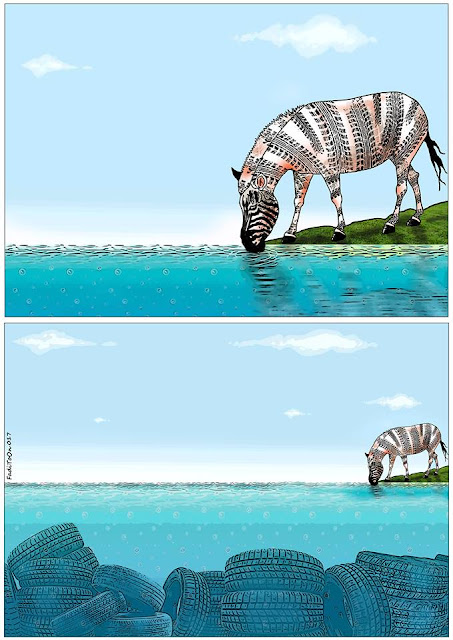The Striving
John Stuart Mill. He is the one, who put the situation into perspective this time too, when the Danish media discovered a case of an "artist" declared guilty of racism back in April and again in July/August in Sweden.
The name of the convict is Dan Park and he, well, there is nothing in what he does, we can remotely refer to as art. There are no layers of interest, nor different approaches we can grasp from the lousy prints that bear his name. They are onesidedly mockers of certain groups of the Swedish society. Not the authorities, questioning those in power, challenging them, making structures visible, which were otherwise unknown, as we saw it with the printed art of the 1970's. No, their only aim is to mock and belittle. The Swedish street artists see no affinity with him.
The matter should never have been taken to court. That is the first and last of it. Jurisdiction has but two options of declaring guilt or innocence, of which neither is a useful answer in a public
context. Dan Park seems on a constant quest to declare himself a victim by way
of defaming others, waiting for them to get enough of him and answer back. Apart
from that observation, I shall waste no more breath on what he does.
The declaration of sensation and scandal in the Danish media is on the other hand all the more telling on how much we have forgotten, taking the freedom of speech for granted in comparison to another discussion I have been following with great interest, particularly when Aya Tarek gave us her input. Aya was one of the very first, the most courageous and especially most talented of the Egyptian mural artists, creating walls well before January 2011, and she is still in her very early twenties.
"I am bored of her genitals", Aya Tarek declared in her usual wonderfully frank manner on the Egyptian FEMEN-activist Alia El-Mahdi. The latter has sullied and bloodied the flag of ISIS, an image of which can be seen here. Aya has all along been unchanging in her demand for artistic merit. Politics must never be an excuse for wasting public attention, and to her eyes Alia El-Mahdi is not an artist. She is but a "desperate attention whore".
This is where it got interesting, in that the discussion immediately turned to the question of attention whoring: Is this but a personal exposure, or could it be a way to transcend one's identity? Does she even transcend pornography in the first place? While she is actually taking a stance, which could be dangerous to her, is this of a type worth taking? Was there any need to apply Western aesthetics and are they even meaningful in a Middle East context? Is the offence needed on a popular media level and what could be other, more powerful ways of communicating?
A meaningful conversation without answers and not seeking them. Al-Mahdi has given us her reaction to a very dangerous situation right now, be it a useful one or not. In discussing this, each comment kept adding aspects just as Mill asked us to bear in mind. Law and authority have no business in restraining our discussing, nor has abusive language, or in his own words: "(...) to restrain this employment of vituperative language".
Sarcasm has no place, nor has the stigmatization of the other, whatever opinion she or he may hold. What is needed, is the calmness to see and honesty to state, what one's opponents and their opinions really are, exaggerating nothing to their discredit, keeping nothing back, which is in their favour, the striving of which:
"This is the real morality of public discussion".
And this blog would not be this blog, unless it claimed the artistic merit with the non-abusiveness of tone of cartooning. Just this week Angel Boligán gave us the pain of racism, using the pointing finger, the godlike facelessness of power, accentuating how racism is an action. An active enterprise with an outcome directed at hurting human beings.
As beholders, Angel Boligán lets us get actively involved. The blood is squrting in our direction, while giving the hurt one a face, an identity. His face mirrors the words written in 1596/98: "If you prick us, do we not bleed?" - back then too giving the exposed one his own voice. With a question mark for reflection.
 |
| Angel Boligán, EL RACISMO DE SIEMPRE, August 30, 2014. |
The artwork shown is courtesy of Angel Boligán and must not be reproduced without his permission.

